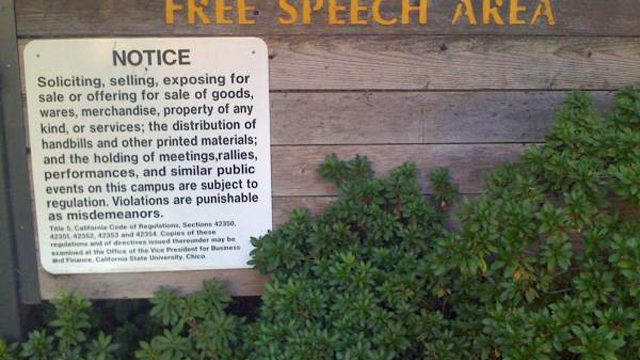What If Colleges Aren't Expanding Minds But Narrowing Them?

Attending college is hugely expensive these days. Between tuition, books, and room and board it is a major financial commitment.
If you asked a representative sample of Americans what aspects of colleges justify that commitment they’d probably talk about things like career advancement, earning potential, and the experience of being on a campus and exposed to new ideas.
Except what if, to that last point, the campus was increasingly a place for narrow minds rather than open ones? Because that seems to be the trend. Even as groups like the Foundation for Individual Rights in Education fight against campus speech codes which restrict the sort of ideas that can be expressed on campus, a majority of students responding to a survey commissioned by the William F. Buckley Jr. Program at Yale say they’re for not only speech codes, but “trigger warnings” too.
Oh, and the 1st amendment is apparently outdated according to a significant number of these students.
To put some numbers behind that perception, The William F. Buckley Jr. Program at Yale recently commissioned a survey from McLaughlin & Associates about attitudes towards free speech on campus. Some 800 students at a variety of colleges across the country were surveyed. The results, though not surprising, are nevertheless alarming. By a margin of 51 percent to 36 percent, students favor their school having speech codes to regulate speech for students and faculty. Sixty-three percent favor requiring professors to employ “trigger warnings” to alert students to material that might be discomfiting. One-third of the students polled could not identify the First Amendment as the part of the Constitution that dealt with free speech. Thirty-five percent said that the First Amendment does not protect “hate speech,” while 30 percent of self-identified liberal students say the First Amendment is outdated.
Results like these turn the traditional narrative of the college experience on its head. The cliche, built as cliches are around some semblance of the truth, was one of bumpkin high school students arriving at some cosmopolitan campus where their biases and notions were challenged by freewheeling discourse. These students were encouraged to jump in and explore and find themselves.
These days the campus seems to be home to an overweening sort of liberal orthodoxy where speech challenging that orthodoxy isn’t welcome.
“I don’t agree with what you say, but I will defend to the death your right to say it,” is something Voltaire didn’t say (it was actually one of his biographers, Evelyn Beatrice Hall), but he did say, “Think for yourselves, and allow others the privilege to do so, too.”
Voltaire was one of the enlightenment thinkers who was held in great esteem by the American revolutionaries. The spirit of his words about free expression live on in the 1st amendment, which today 30 percent of self-described “liberal” college students feel is outdated.
How can colleges be a place of free inquiry when, increasingly, speech which some consider hateful or controversial is silenced?
What’s ironic is that the campus liberals of another day were fierce proponents of free speech, standing on the 1st amendment to push back against efforts by administrators to quash anti-war and civil rights protests. But now those student liberals of the 60’s and 70’s are the liberal administrators of today’s campuses, and they seem largely hostile to dissent.
The featured image is from California State University, Chico.




